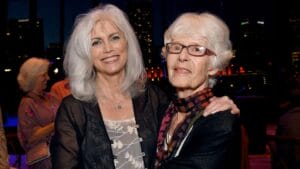Born in Toronto, Ont., Canada, Martin wasn’t sure what to do with her life. She went to, and dropped out of, two universities. She worked as a waitress, and a clerk. But she had a knack for music — not making it, or even writing it, but she had an ear for talent and a way to put people together so they could be successful. She remembered going to a Toronto tavern and being fascinated by a group playing. “Those boys talked to each other musically,” she remembered. “They were the best band that we had ever, ever heard.” They were called the Hawks; she made note, and moved on — finding a job with a folk music manager in New York City. His clients included Peter, Paul and Mary — and Bob Dylan.
At the time, Dylan was tiring of the restrictions placed on folk music, such as only playing acoustic instruments. He wanted to experiment. What Dylan really needed, Martin thought, was a great backup band. The Hawks, the Toronto group Martin remembered, had regrouped and moved to the U.S. “Mary was a rather persevering soul,” Dylan said in 1969. “She kept pushing these guys the Hawks to me.” It worked: they went on a world tour together in 1966, cementing Dylan’s fame. They changed their name to the Band, got a record deal, and eventually were inducted into the Rock and Roll Hall of Fame.

Martin left the manager’s employ and took on a fellow Canadian as a client: Leonard Cohen. As his manager, she coaxed him into her apartment’s bathroom — for the acoustics — and recorded him playing. Cohen was shy, and not sure he had a good enough voice to be a performer. After all, he had started out as a poet and songwriter in Canada. She sent the recording to Columbia Records; they gave him a contract. Martin also reassured Cohen about his voice; he not only became hugely successful, in 2023 Rolling Stone ranked Cohen No. 103 on their “200 Greatest Singers of All Time” list. Snapped up by Warner Bros. Records, Martin again tapped her folk roots, signing Emmylou Harris to a contract. To help her develop her sound, she connected her with Canadian record producer Brian Ahern, who produced her next ten albums — and married her.
Meanwhile, Martin was angry that Warner execs refused to promote Harris to country radio stations, so she quietly hired promoters herself, helping Harris chart her first No. 1 country hit. She signed Bonnie Raitt, Kate and Anna McGarrigle, Leon Redbone, Nicolette Larson, the Marshall Tucker Band, Thin Lizzy, Clint Black, and Lorrie Morgan. Last, Martin signed singer-songwriter Rodney Crowell to Warner — and then quit to manage his career, persuading him to produce records for other artists, including Bobby Bare, Rosanne Cash, and Guy Clark. To date he has produced more than 150 albums. “She was a pioneer,” Crowell said. “Her thing was putting people together — having a vision that the creative outcome would be really well worth the time spent.”

“She didn’t have a lot of tolerance for those who stood in her way,” said fellow Warner exec Bonnie Garner. “The glass ceiling — if it existed — we didn’t recognize it.” Martin spent the last half of her life in Nashville, Tenn., and helped musicians even when her efforts didn’t benefit herself, helping Keith Whitley and Vince Gill, among others. She won a Grammy for co-producing Timeless — a Hank Williams tribute album. The Americana Music Association presented Martin with a lifetime achievement award in 2007, and in 2009 the Country Music Hall of Fame and Museum honored Martin at its annual Louise Scruggs Memorial Forum. “Time and again, Mary Martin spotted great talents and elevated their careers,” said Kyle Young, the CEO of the Country Music Hall of Fame. “Mary’s unerring feel for songs and performers was legendary, and she was a fierce ally for the artists she represented.” Martin died July 4, from cancer, in a Nashville hospice. She was 85.
